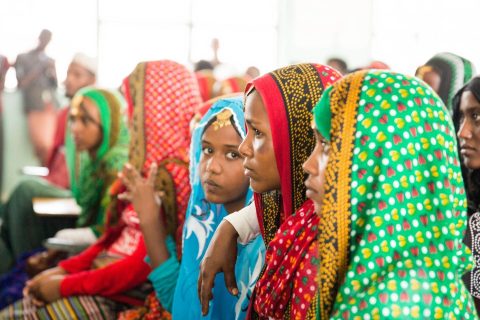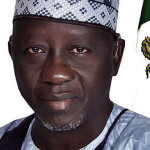Girls’ Education Must Come First
African News, Latest Headlines Tuesday, March 8th, 2022
(AFRICAN EXAMINER) – For decades now, world leaders have talked about ending hunger and poverty and building a new world order based on human rights and gender-equality.
Still, we have an estimated 64 million girls and adolescent girls suffering in brutal conflicts, forced displacement and climate-induced disasters who are held back by illiteracy and left without hope for their future. Amongst them, analysis indicates that as many as 20 million girls may never return to school as a result of the COVID-19 pandemic.
It is not enough to have goals and a vision unless we turn that vision into action. Every girl has an inalienable right to a minimum of 12 years of quality education. Girls and teenage girls in conflicts and forced displacement suffer multiple risks already, such as trafficking, gender-based violence and early-childhood marriage, and thus are those left furthest behind in turning our goals and visions into reality. Their education must now come first.
Investing in girls’ education is not just about delivering on our promise of inclusive and equitable education, or Sustainable Development Goal 4, it is the very foundation for reaching all other goals in the 2030 Agenda for Sustainable Development. Without an education, these girls will never be able to lift themselves out of abject poverty and we can no longer aspire to achieving gender-equality.
We need a laser focus on girls’ education in emergencies and protracted crisis to achieve multiple Sustainable Development Goals. Their experiences of inhumanity, loss and destitution can be turned around into their potential to become empowered women able to contribute to their war-torn countries and communities. Without them – 50% of the population – no crisis-country can build back better. It is logistically impossible.
All the evidence indicates that investing in girls’ education provides one of the best returns-on-investment for overseas development assistance – and the enabling environment and strong women leaders and professionals we need to achieve the Sustainable Development Goals, Paris Agreement targets and other international accords.
According to Plan International, every dollar spent on girls’ education has the potential to generate a general return of $2.80. This could boost GDP in developing countries by 10% over the next 10 years, resulting in less poverty, hunger and violence, and more resilience and greater capacity to respond to new fast-acting crises.
With just eight short years left to deliver on this global promise, we need to build on the progress made, including the Education Cannot Wait target of 60% girls and adolescent girls in crisis-affected countries.
It starts with financing. Education Cannot Wait, the United Nations global, billion-dollar fund for education in emergencies and protracted crises, has reached approximately 2.3 million girls since its inception five years ago. With $1 billion in additional resources, the Fund could reach an additional 9 million girls by 2026.
It takes partnerships and the United Nations New Way of Working whereby humanitarian and development actors work together towards collective learning outcomes, hence peacebuilding, or what we call the humanitarian-development-peace nexus.
As we are in a race against time and we need real learning outcomes, it also requires humanitarian speed and developmental depth. This is precisely what Education Cannot and its partners in host-governments and communities, the UN system and civil society as well as private sector are doing. We are doing it together, we do it with speed and we are on a quest for results.
Working closely with our in-country partners, we understand the realities these girls and young women face, and tailor our responses to meet their holistic needs. This entails a protective learning environment, gender-sensitive curriculum, mental health and psycho-social services, teacher training, social-emotional skills as well as academic skills, in countries like Nigeria, the Democratic Republic of the Congo, Uganda or Lebanon.
To ensure continuity for crisis-affected girls and adolescent girls – of whom only 1 out of 4 is able to complete lower secondary education – we need to make sure that all girls make the transition to high school and beyond, and are able to participate in science, technology, engineering and math studies.
It means creating safe learning environments so girls can walk safely to school without fear of abduction or assault.
It means empowering female teachers and providing incentives to teach science, provide education of menstrual health and hygiene, and ensure dignity in the home and in the classroom.
It means understanding the direct link between climate action and forced displacement and building an education system that that is resilient to climate-change induced disasters. And it means partnering with local women and girls’ groups and organizations, and delivering across a wide range of partnerships that bring together government, UN agencies, donors, philanthropic foundations, civil society and local communities.
There is no simple solution to the interconnected global crises that have left so many girls behind. We do know however through the work of the UN’s Global Fund for Education in Emergencies and Protracted Crisis that by working together through joint planning and one joint programme towards collective outcomes, we can reach the girls and adolescent girls left furthest behind in conflict zones, refugee camps and war-affected communities. We also know that lack of financing is the biggest challenge in achieving our vision of providing a quality and continued education to 64 million girls. So, on International Women’s Day, let us remind ourselves that their right to an education, their human rights, are actually priceless.
This Op-Ed was originally published on Modern Diplomacy. On the International Women’s Day, Education Cannot Wait (ECW) celebrates the role of education in advancing gender equality and building the women leaders of tomorrow.
The author is the Director of ECW, the United Nations global fund for education in emergencies and protracted crises.
Related Posts
Short URL: https://www.africanexaminer.com/?p=74512






















